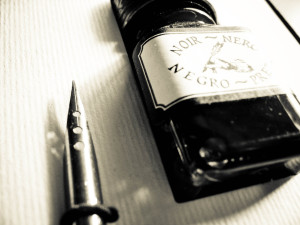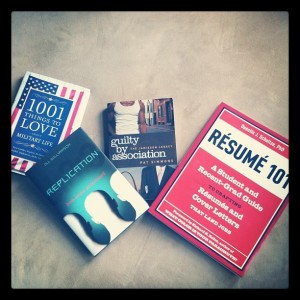Ask the Agent: On Memoir, Bookspan, Facebook, and Writing Resources
I thought this was a very insightful question: “Can you clear something up for me? You have said you thought memoir was a growing category in publishing. But you’ve also said personal stories are hard to sell. How can that be?”
We have to define our terms. A memoir is the thoughts or reminiscences of a writer – usually based on celebrity (Justin Timberlake is doing a book!), significant events in the culture (I shot Osama bin Laden!), or fabulous writing (Have you seen what Jeannette Walls just released?). It doesn’t have to be linear. It usually touches on a number of significant themes. In the last couple of years we’ve seen huge growth in the memoir category, in all of those areas. We’ve had good celebrity memoirs (Tina Fey, Mindy Kaling, etc), good event-based memoir (American Sniper, Lone Survivor, etc), and good memoirs from writers (Ann LaMott, Annie Dillard, etc).
When I saw to be wary of “personal stories,” I’m talking about people who aren’t creating a memoir, but wanting to write a book that basically says, “Here is what happened to me, and it’s cool.” It’s generally linear. It might have some lessons to share, but rarely touches on many deeper themes. The writing is pedestrian – more of a prescriptive how-to book than reflective musing. These aren’t discreet categories, of course – is Lone Survivor a deeper memoir or simply a scary retelling of how Marcus Luttrell survived? But by and large we see personal stories as someone who has gone through something they found profound, and they want to tell their story because their friends have said to them, “You should write a book!” And, in my view, those books rarely get picked up.
Someone asked, “What is Bookspan? What all do they do? And how do you get picked up by them?”
Do you remember the old Book of the Month Club? Or the Literary Guild? Well, Bookspan purchased and combined those companies, along with the History Book Club, the Mystery Guild, the Military Book Club, Crossing Christian books, and just about every other mail-order book club. They own 19 of those, at last count, are privately owned, and they contract with all the major publishers to produce and sell books. They have on very rare occasions contracted a couple of self-published books, but that is not how they normally acquire titles.
Someone sent this: “Do you think a Facebook tour can be useful for marketing your novel? I had a friend offer to post things on FB, because she doesn’t have a blog, and I wondered if it might be helpful.”
I want to think that Facebook can be useful for marketing a novel, but I’m not seeing much empirical evidence that confirms it (and believe me, I’ve looked). My guess is that Facebook is one good strategy for getting the word out to your friends upon your novel’s release. Used in conjunction with other marketing strategies, it probably helps. But does a Facebook-focused marketing strategy work? Not in a big way, in my view. It needs to be one plank in a larger platform. But I tell you what… I’m going to ask a couple marketing professionals what they think about this question, and come back to it, okay?
And here’s one that’s a bit off the beaten path: “Do you have any counsel on how to edit systematically–with a goal of editing the same document a dozen times (or less) rather than twenty, thirty, or forty?”
Hmmm… I could think of a few tricks that might make the editing process easier. First, put other eyes on it. That is, get some other people to read it and comment, or simply hire a freelance editor to clean it up. That will speed things up. Second, create an editorial list of things you want to check for each time – homonyms, numbers, the use of the word “that,” circle all your adjectives, etc. Your list will be different than mine, of course, but figuring out what you need to check for can be helpful, and can speed things up.
A fascinating question from an author: “How do I know a good agent from a bad one? I’m unpublished, but looking for an agent for a teen girl book. Any advice?”
Sure. Let’s set some basic rules: First, I think there’s no one agent that’s a fit for every author. Second, you’ll do best if you know what you need in an agent, in order to find who is a “good” agent for you. So I think to find a good agent, you need to know yourself and how an agent can best help you. Do you need someone with whom you can talk through ideas? Do you most need an editor? Do you need someone who focuses on contracts and negotiations? Do you need a career counselor? Do you need a personal manager? Do you need someone who can manage things beyond book contracts – speaking engagements, money management, etc.? Figuring out who you are and what you need allows you to start doing some substantive research on the various agents out there. It can even help you decide that you don’t need an agent at all.
But third, there are certainly some basic expectations every author should expect from a “good” literary agent: A knowledge of the current market. An ability to evaluate the salability of your idea. Some sort of helpfulness on your ideas and writing. Connections to editors and publishers. Experience with publishing contracts. An ability to negotiate. A willingness to take your part and handle the difficult discussions that tend to arise in every author/publisher relationship. Perspective on the big picture of your career and the current market. Integrity in handling author monies. Honesty with you about your manuscript and your place in the world of publishing. A guarantee that they won’t charge you a fee or make a secret profit from any transaction on your work. If you’re interested in this topic, I urge you to visit the Association of Author Representatives website at aaronline.org, and check out the “agent’s code of ethics” on the first page. It lays out what every author should expect (and, um… NOT every agent abides by it).
And this reader offers a wonderful suggestion: “I think it would be fun to ask your readers to write in and compile a ‘best of’ blog with a list of favorite books or writing resources. My favorite books on the craft of writing are Stephen King’s On Writing and Anne MaMott’s Bird by Bird, and I would be interested to hear what other informed blog readers think. For that matter, it would be fun to find out their favorite conference is.”
Love the idea. So to readers of this blog, what’s your favorite writing resource? And what is the best writing conference you’ve attended?



26 Comments
One of the most helpful books is Self-Editing For Fiction Writers by Brown and King. Years ago I attended an amazing four day retreat for writers at BookPassage conducted by Elizabeth George. She was a great help.
Reading the Zinsser book right now. Terrific. Stegner’s “Where the Bluebird Sings” finishes with this wonderful tidbit: “You take something that is important to you, something you have brooded about. You try to see it as clearly as you can, and to fix it in a transferable equivalent. All you want in the finished print is the clean statement of the lens, which is yourself, on the subject that has been absorbing your attention.”
Good thoughts on memoir vs. personal story. I’m teaching a memoir class to a couple of ladies who wanted to write their personal stories. The first couple of weeks we’ve focused on the importance of theme and what a memoir really is. It’s been fun to see how they’re able to reflect on their personal stories and identify the specific theme and message they want to share. They’ll probably never publish their memoirs, but it’s been rewarding seeing them go from nonwriters to understanding their personal stories as it applies to a memoir writing.
Jeff Gerke’s Plot versus Character hasn’t yet been mentioned. I especially loved his chart on page 247. When Jeff taught from this book at the Oregon Christian Writers Conference, I finally learned how to interweave plot and character, keeping relevant characters moving along a compelling story line.
Best Writing Conference, Novelists, Inc. Best Book on Writing–two of them. The Art of Fiction and Fiction is Folks.
Thanks, Vicki. There are several “The Art of Fiction” titles — I assume you mean John Gardner’s version, and not Ayn Rand or Henry James? And Robert Peck’s “Fiction is Folks” is a GREAT resource for novelists who want to create strong characters. It’s one of those books that I’m surprised doesn’t get mentioned more.
Yes, exactly. (You know me too well!) Gardner’s book is fantastic. At different stages of your writing, you gain different insights into what he’s presenting.
On Robert Peck’s book, his tone is light and conversational and you find yourself smiling and laughing as you read. It’s amazing how much that helps you remember. I’ve had, I think, five copies of this book. I highlight so much it becomes unreadable.
Same is true of Gardner’s. I read, mark up, and when I can’t read for the markups anymore, it’s time for a new copy. 🙂
I go along with the books mentioned so far. Another favorite of mine is Story–Substance, Structure, Style, and the Principles of Screenwriting by Robert McKee. Though written for screenwriters in particular, literary novelists will enjoy his in-depth take on what’s required to shape a story into something truly good.
Favorite conference so far has been Willamette Writers in Portland, but I look forward to stretching my wings.
There are a ton of good conferences, Peggotty, and Willamette Writers is one of the best on the west coast. Great faculty, good ideas, creative thinkers. Thanks!
Steven King’s On Writing is my favorite writing book of all time, mostly because I laughed out loud so many times. For true craft books–how to write better stories–the books that come to mind are everything by Donald Maass, James Scott Bell’s Plot and Structure, and Stein on Writing.
Thanks, Robin. If you like Stephen King’s excellent ON WRITING, check out Elizabeth George’s WRITE AWAY.
Thanks. I’ll check it out.
I agree, Bird by Bird, and On Writing are the best books for learning technical skills. But Annie Dillards, The Writing Life, helped me understand who I was as a writer. I saw how the weird, quirky parts of me were there, simply because…well, I’m a writer. It revolutionized my writing soul.
Also, Susie May Warrens, My Book Therapy, was essential to me in writing my memoir. I felt like she was not only my editor, by my friend as well.
Annie Dillard’s book is indeed wonderful, Ellen. Glad you mentioned it.
I learn best by doing, so my favorite writing resource is a great editor. It’s more expensive than reading a book, but my editor has taught me more than any writing book I’ve read.
My local ACFW chapter has several prolific authors (Janice Thompson for one), and I learn so much just talking to them each month. It’s not a “conference,” but a writing group is a great way to learn the craft, “borrow” marketing ideas, etc.
I’m glad you said something, Laura. Sometimes a live group that is interacting and reading one another’s work can be much more helpful than a bunch of new content at a conference. Thanks.
Best conference: It’s a tie for me between Glorieta (extinct) and Mt. Hermon. Both had unique opportunities and styles. Best book: Zinsser’s On Writing Well.
Love Zinsser’s book — one that I used as a textbook when I spent time as a university writing instructor, Ron. Great stuff.
Best book about writing and creativity – Walking on Water: Reflections on Faith and Art by Madeleine L’Engle.
What a wonderful, thoughtful book. Thanks for the suggestion, Marlena. I love that book.
Best Craft Book: Techniques of the Selling Writer, by Dwight V. Swain.
A good choice, Aimous. Thanks.
Best conference: Blue Ridge. Favorite book on writing: Honestly, there are so many styles and contradictory advice found in different books I’ve looked at, that I’ve realized what comes to my mind first is just knowing the Chicago Manual of Style inside and out.
Blue Ridge is great. Alton Gansky does a fabulous job putting it together every year.
Best writing conference? Glorieta, no doubt (and how I miss it). Best book on writing fiction I’ve ever read? Telling Lies for Fun and Profit, by Lawrence Block. Sharp, funny, and chock-a-block with great tidbits.
Glorieta? In New Mexico? I never went to the official conference, John. Been to the site for the re-make of it, but it didn’t really work. What made it so good?